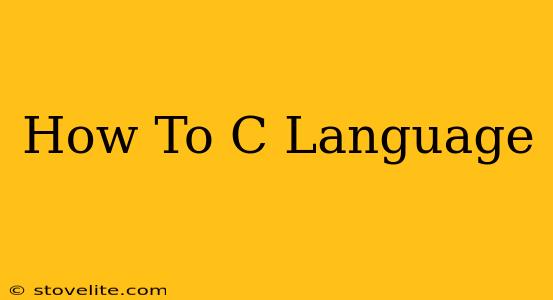Learning C can feel daunting at first, but with a structured approach and the right resources, you can master this powerful language. This guide provides a roadmap for beginners, covering essential concepts and practical steps to get you started.
Why Learn C?
C is a foundational language with a rich history and enduring relevance. Understanding C provides a solid base for learning other programming languages. Here's why it's worth the effort:
- Understanding Computer Systems: C operates close to the hardware, giving you insights into how computers work at a lower level than higher-level languages. This is invaluable for system programming, embedded systems, and game development.
- Efficiency and Speed: C is known for its efficiency and speed, making it ideal for performance-critical applications.
- Portability: C code can be compiled and run on a wide variety of platforms with minimal modification.
- Memory Management: While demanding, mastering C's manual memory management provides a deep understanding of how memory works, benefiting your coding skills even when working with languages that handle memory automatically.
- Foundation for Other Languages: Many popular languages like C++, Java, and Python, borrow heavily from C's syntax and concepts. A strong C foundation will significantly accelerate your learning curve in these languages.
Getting Started: Essential Tools and Resources
Before you begin writing code, you'll need the right tools. Here are the key components:
- A C Compiler: A compiler translates your C code into machine-readable instructions. Popular options include GCC (GNU Compiler Collection) and Clang. These are often included in Linux distributions and readily available for download on Windows and macOS.
- An Integrated Development Environment (IDE): While not strictly necessary, an IDE simplifies the coding process by providing features like code editing, debugging, and project management. Popular choices include Code::Blocks, Eclipse CDT, and Visual Studio Code.
- A Good Textbook or Online Course: Numerous excellent resources are available for learning C. Consider exploring interactive online courses (Coursera, edX, Udemy) or reputable textbooks.
Key Concepts to Master
Learning C involves understanding fundamental concepts. These are some key areas to focus on:
- Data Types: Learn about integers (int), floating-point numbers (float, double), characters (char), and booleans (bool). Understanding data types is crucial for efficient memory management and correct program behavior.
- Variables and Constants: Variables store data that can change during program execution, while constants store values that remain fixed. Proper naming conventions are essential for readability and maintainability.
- Operators: C offers a wide range of operators, including arithmetic (+, -, *, /, %), relational (==, !=, <, >, <=, >=), logical (&&, ||, !), and bitwise operators.
- Control Flow: Mastering
if,else,switch,for, andwhilestatements allows you to control the order of execution in your program. These are fundamental for creating logic and decision-making within your code. - Functions: Functions break down complex tasks into smaller, manageable units, promoting code reusability and organization. Learn how to define, call, and pass arguments to functions.
- Arrays and Pointers: Arrays store collections of data of the same type, while pointers store memory addresses. Understanding pointers is crucial for working with memory directly and is a key differentiator of C. However, it's also a frequent source of errors for beginners, so practice extensively.
- Structures and Unions: Structures group variables of different data types together, while unions allow you to store different data types in the same memory location.
- File Handling: Learn how to read data from and write data to files. This is essential for many practical applications.
Practice, Practice, Practice!
The key to mastering C is consistent practice. Start with simple programs and gradually increase complexity. Work through exercises in your chosen learning resource and experiment with different concepts. Don't be afraid to make mistakes; debugging is an integral part of the learning process.
Beyond the Basics: Advanced C Programming
Once you've grasped the fundamentals, you can explore more advanced topics like:
- Dynamic Memory Allocation: Learn how to allocate and deallocate memory during program runtime using functions like
mallocandfree. - Preprocessor Directives: Understand how preprocessor directives (#include, #define, etc.) work.
- Pointers to Pointers: This is a challenging but powerful concept that allows you to manipulate pointers indirectly.
- Linked Lists and Other Data Structures: Learn to implement fundamental data structures.
Learning C is a journey, not a race. By following a structured approach, utilizing available resources, and consistently practicing, you will successfully acquire the skills and knowledge needed to become proficient in this powerful and versatile programming language.

